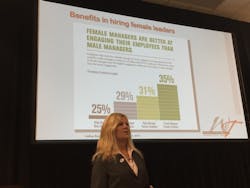Working on ways to bring more women into trucking
As the shortage of truck drivers continues to grow – based on current trends lines of freight demand versus truck driver availability, a potential shortfall of 239,000 drivers may develop by 2022 – motor carriers are trying to figure out how to convince more “new blood” to take up piloting big rigs for a living.
And such “convincing” won’t be easy, as Clay Murdoch, president of Doug Andrus Distributing, explained during a panel discussion on driver demographics at the McLeod Software 2017 User Conference this week.
“We have to level with people that they are coming into one of the most difficult jobs they’ve ever had,” he said.
Not exactly a sure-fire approach to winning hearts and minds for a career behind the wheel.
Yet truck driving can be a better career than in the past, as fleets work to provide more pay, home time, and other benefits. But to truly increase the available pool of applicants, many believe trucking needs to continue reaching “outside the box” for “non-traditional” truck driver recruits – and that includes women.
Right now – depending on which set of numbers you look at – women comprise between 4.1% and 6% of the overall truck driver population; a population that currently hovers around 3.5 million, with 3.1 million of that total holding commercial driver’s licenses (CDLs).
Yet as Ellen Voie, president of the Women in Trucking (WIT) advocacy group explained at the McLeod conference, different approaches are needed to recruit and retain female workers in freight hauling world – and not just as truck drivers, either.
“Women can bring a different perspective to the business, be it the driver’s seat, the board room, or the executive office,” she said.
And Voie stressed that one factor that favors trucking’s recruiting efforts where females are concerned is that women can actually earn 30% more in “non-traditional” careers when compared to “typical” occupations for their gender such as teaching and nursing.
In many ways, though, transportation is not really a “non-traditional” career choice for women – something Elaine Chao, U.S. Secretary of Transportation, stressed in a speech earlier this year.
“Even in the early stages of modern transportation, women helped advance technology through their innovative ideas and inventions. By 1923, more than 175 patents were granted to women for inventions related to vehicles, traffic signals and turn indicators,” she said.
“Their achievements helped pave the way for others. Leaders like Elizabeth Dole, who on February 7, 1983, broke the glass ceiling to become the eighth U.S. Secretary of Transportation and the first woman to ever hold that position. Or Mary Peters, who on October 17, 2006, became the 15th U.S. Secretary of Transportation,” Chao pointed out. “Or Mary Barra, who in 2014, became CEO of General Motors and the first woman to lead a major auto manufacturer.”
Chao emphasized that women continue to play a key and growing role in transportation, noting that women-owned businesses won more than 9% of Department of Transportation (DOT) procurement direct contracts in fiscal year 2015, along with 64% of “indirect contracts” with the Federal Aviation Administration, Federal Highway Administration, and the Federal Transit Administration; contracts totaling more than $2.4 billion.
“These are just a few examples of women achieving success in the transportation sector,” she said. “So although there is still more to do, we’ve come a long way.”
Chao added that there isn’t a better time for women to pursue a career in transportation than right now – a sentiment Voie echoed in her talk.
“Why can women be better truck drivers? Because they avoid risk,” she explained. “They also tend to do their ‘homework’ more. For example, while many male drivers leave [their jobs] due to home time issues, women tend to leave over equipment. Their turnover tends to be lower, too; they are usually coming into this industry after raising their families. They know to a degree what they are getting into.”
That’s not to say women drivers don’t quit the business; they just do so for different reasons – ones often having to do with work relationships.
“Female drivers tend to stay longer if they have a good relationship with their dispatcher,” Voie pointed out. “But they will leave quicker if that relationship goes south.”
She shared a few other insights regarding female recruitment and retention issues, along with the benefits women can bring to trucking overall as well:
- Women want to make a difference: “Talk about the impact transportation has on our country; it feeds their families and their neighbors,” Voie explained.
- Women want a challenge: A surprising statistic from the 11,000 female members of WIT’s Facebook page is that 80% of them have motorcycle licenses, she said. So while women might not be “risk takers,” they do not lack an “adventurous spirit,” Voie noted.
- Women are team players: Women are driven by estrogen, which is a chemical that encourages “bonding and connection” while discouraging conflict and risk-taking. That makes them more attuned to value “long-term and team goals,” according to Halla Tomasdottir, Icelandic Fund Manager.
- Women desire a sense of work satisfaction: They want to believe in a company’s mission, whether it is hauling fuel, food, or other goods that make modern daily life possible, and they want to feel a part of that effort, Voie said.
- Women want recognition for their efforts: While pay and benefits of course matter most of all, female truck drivers – like their male counterparts – desire to be appreciated for the work they do.
Things to consider as the efforts to recruit more folks to serve as commercial vehicle operators roll on.


